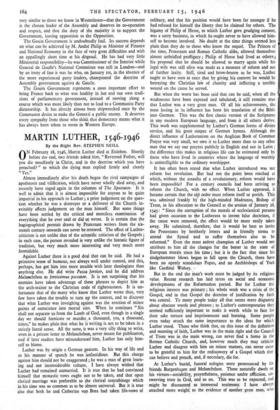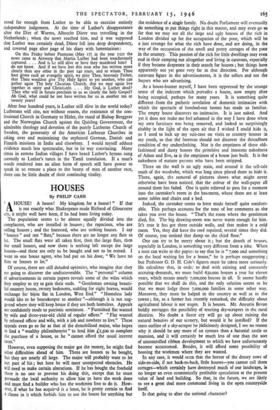MARTIN LUTHER, 1546-1946
By the Right Rev. STEPHEN NEILL
ON February 18, 1546, Martin Luther died at Eisleben. Shortly before the end, two friends asked him, "Reverend Father, will you die steadfastly in Christ, and in the doctrine which you have preached?" to which the dying man replied firmly and clearly yes:, Almost immediately after his death began the rival campaigns of apotheosis and vilification, which have never wholly died away, and recently have raged again in the columns of The Spectator. It is well to admit that it is almost impossible for anyone to be quite impartial in his approach to Luther ; a prior judgement on the ques- tion whether he was a destroyer or a deliverer of the Church in- evitably affects judgement on the man himself. But some things have been settled by the critical and merciless examination of everything that he ever said or did or wrote. It is certain that the hagiographical portrait drawn by Protestant writers from the six- teenth century onwards can never be restored. The effect of Luther- criticism is not unlike that of the scientific criticism of the Gospels ; in each case, the person revealed is very unlike the hieratic figure of tradition, but very much more interesting and very much more formidable.
Against Luther there is a good deal that can be said. He had a primitive sense of humour, not always well under control, and this, perhaps, has got him into more trouble with later theologians than anything else. He did Write Pecca fortiter, and he did address Melanchthon as fortissimus peccator. It is not surprising that his enemies have taken advantage of these phrases to depict him as the arch-traitor to the Christian code of righteousness. It is un- fortunate that of the many who know that Luther wrote thus, very few have taken the trouble to turn up the context, and to discover that what Luther was inveighing against was the erection of minor points of conscience into mortal sins. When he continues "Sin shall not separate us from the Lamb of God, even though in a single day we should fornicate or murder a thousand, yea, a thousand, times," he makes plain that what he is writing is not to be taken in a strictly literal sense. All the same, it was a very silly thing to write, even in a private letter to Melanchthon, never meant for publication, and if later readers have misunderstool him, Luther has only him- self to blame.
Luther was by origin a German peasant. In his way of life and in his manner of speech he was unfastidious. But this charge against him should not be exaggerated ; he was a man of great learn- ing and not inconsiderable culture. I have always wished that Luther had remained unmarried. It is true that he had convinced himself that monastic vows ought not to be taken, and that open clerical marriage was preferable to the clerical concubinage which in his time was so common as to be almost universal. But it is true also that both he and Catherine von Bora had taken life-vows of celibacy, and that his position would have been far stronger if he had refused for himself the liberty that he claimed for others. The bigamy of Philip of Hesse, to which Luther gave grudging consent, was a sorry business, in which he ought never to have allowed him- self to become involved. No doubt at the time things seemed less plain than they do to those who know the sequel. The Princes of the time, Protestant and Roman Catholic alike, allowed themselves almost unbridled profligacy ; Philip of Hesse had lived as others I his proposal that he should be allowed to marry again while his legal wife was still alive was made as a measure of reform and not of further laxity. Still, tired and brow-beaten as he was, Luther ought to have seen at once that by giving his consent he would be betraying the Christian la* of chastity and inflicting a terrible wound on the cause he served.
But when the worst has been said that can be said, when all the weaknesses have been exposed and tabulated, it still remains true that Luther was a very great man. Of all his achievements, the most lasting in its influence has been his translation of the Bible into German. This was the first classic version of the Scriptures in any modern European language, and from it all others derive. This work was supplemented by Luther's German forms of divine service, and his great output of German hymns. Although the direct influence of Lutheranism on the Anglican Book of Common Prayer was very small, we owe it to Luther more than to any other man that we say our prayers publicly in English and not in Latin ; the difference this makes in religious life can be estimated only by those who have lived in countries where the language of worship is unintelligible to the ordinary worshipper.
It has often been stated that what Luther introduced was not reform but revolution. But had not the point been reached at which, without the assaults of a revolutionary, reform would have been impossible? For a century councils had been striving to reform the Church, with no effect. When Luther appeared, it became certain that the old order must reform itself or perish. This was admitted frankly by the high-minded Madruzzo, Bishop of Trent, in his allocution to the Council at the session of January 28, 1545: "Since the corruption of the morals of ecclesiastical persons had given occasion to the Lutherans to invent false doctrines, if the cause were removed, the effect would be more easily taken away. He submitted, therefore, that it would be best to invite the Protestants by brotherly letters and in friendly terms to attend the Synod and to suffer themselves also to be reformed." Even the most ardent champion of Luther would not attribute to him all the changes for the better in the state of European morals since his time ; but it is the fact that since his sledgehammer blows began to fall upon the Church, there have been no openly scandalous Popes, and no Archbishops of York like Cardinal Wolsey. - But in the end the man's work must be judged by its religious value. Recent research has laid stress on social and economic developments of the Reformation period. But for Luther the religious interest was primary ; his whole work was a crisis of the Gospel, and in that Gospel the doctrine of justification by faith was central. To many people today all that seems mere disputing about obscure words and phrases ; to Luther's contemporaries they seemed sufficiently important to make it worth while to face for their sake torture and imprisonment and burning. Some people even today attach the same importance to the ideas for which Luther stood. Those who think that, on this issue of the definition and meaning of faith, Luther was in the main right and the Council of Trent was in the main wrong, can never find a home in the Roman Catholic Church, and, however much they may criticise Luther and disagree with him on minor matters, can never cease to be grateful to him for the rediscovery of a Gospel which they can believe and preach, and, if necessary, die for.
At Luther's burial, funeral eulogies were pronounced by his friends Burgenhagen and Melanchthon. These naturally dwelt on his virtues—amiability, prayerfulness, patience under affliction, un- swerving trust in God, and so on. This was to be expected, and might be discounted as interested testimony. I have always attached more weight to the evidence of another great man, who stood far enough from Luther to be able to exercise entirely independent judgement. At the time of Luther's disappearance after the Diet of Worms, Albrecht Diirer was travelling in the Netherlands ; when the news reached him, and it was supposed that Luther was certainly dead, Diirer fell into deep despondency, and covered page after page of his diary with lamentations:
On this Friday before Pentecost (May 17) in the year 1521 the news came to Antwerp that Martin Luther had been treacherously captured. . . . And is he still alive or have they murdered him? I do not know. And if we have lost this man who has written more clearly than any other in the past 140 years, and to whom Thou hast given such an evangelic spirit, we pray Thee, heavenly Father, that Thou wouldest give Thy Holy Spirit to yet another, who can gather again Thy holy Christian Church, that we may again live together in unity and Christianly. . . . My God, is Luther dead? Then who will in future proclaim to us so clearly the holy Gospel? Ah God, what could he not have written for us in another ten or twenty years?
After four hundred years, is Luther still alive in the world today? Lutherans will cite, not without reason, the resistance of the con- fessional Church in Germany to Hitler, the stand of Bishop Berggrav and the Norwegian Church against the Quisling Government, the admirable theology and devotion of the purely Lutheran Church of Sweden, the generosity of the American Lutheran Churches in
taking over and maintaining the orphaned German, Danish and Finnish missions in India and elsewhere. I would myself adduce evidence much less spectacular, but in its way convincing. Many
times in remote Indian villages I have heard Luther's hymns sung correctly to Luther's tunes in the Tamil translation. If a man's words rendered into an alien form of speech still have power to speak in so remote a place to the hearts of men of another race, there can be little doubt of their continuing vitality.



























 Previous page
Previous page